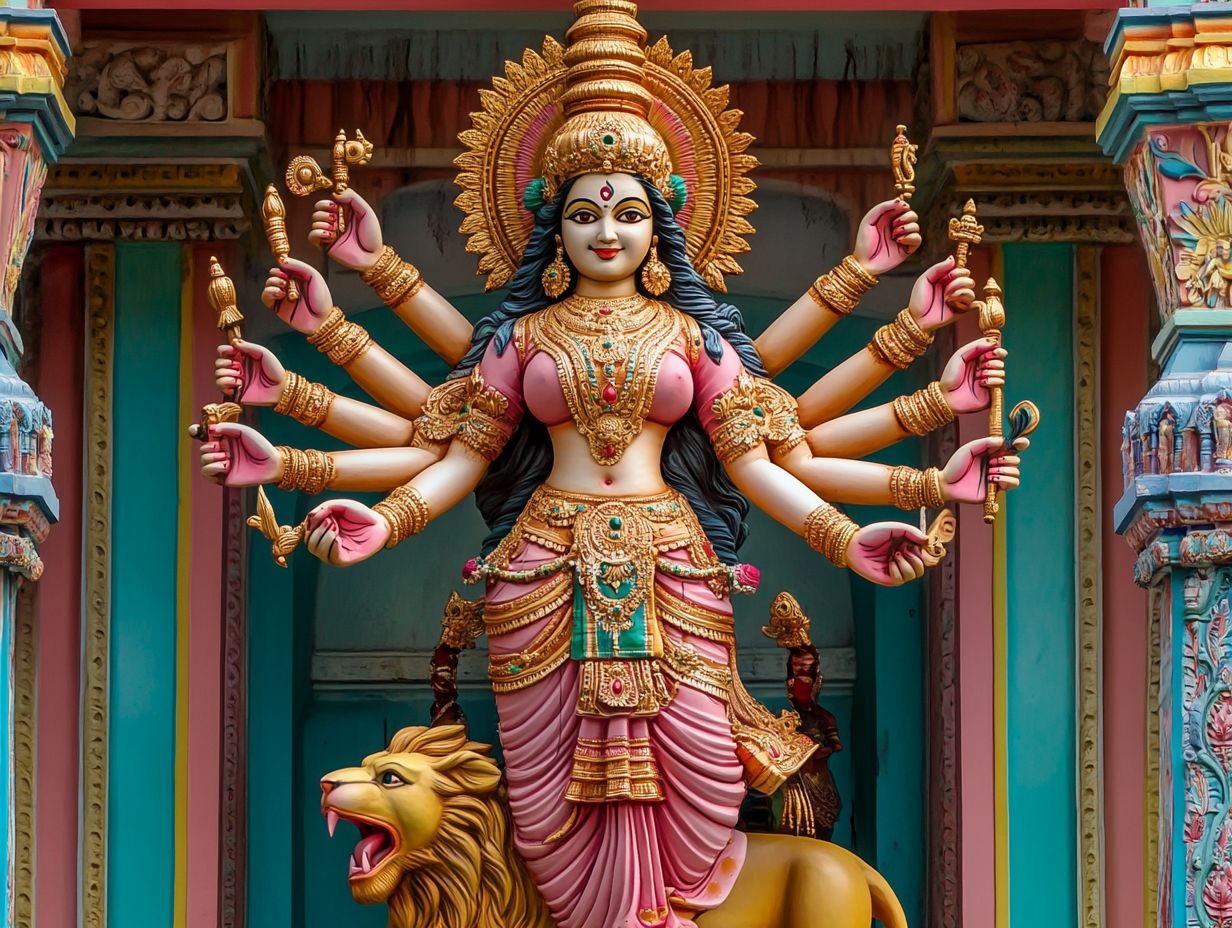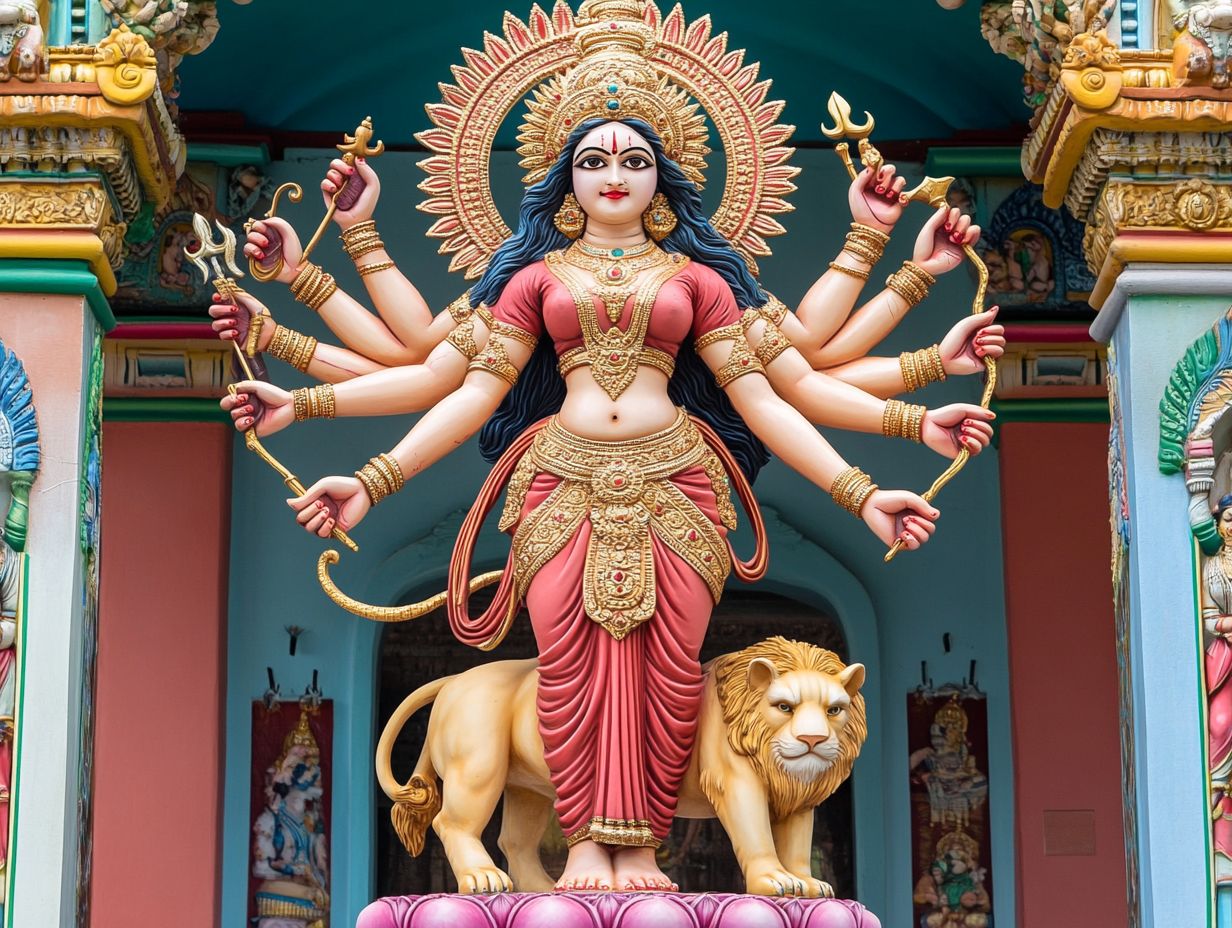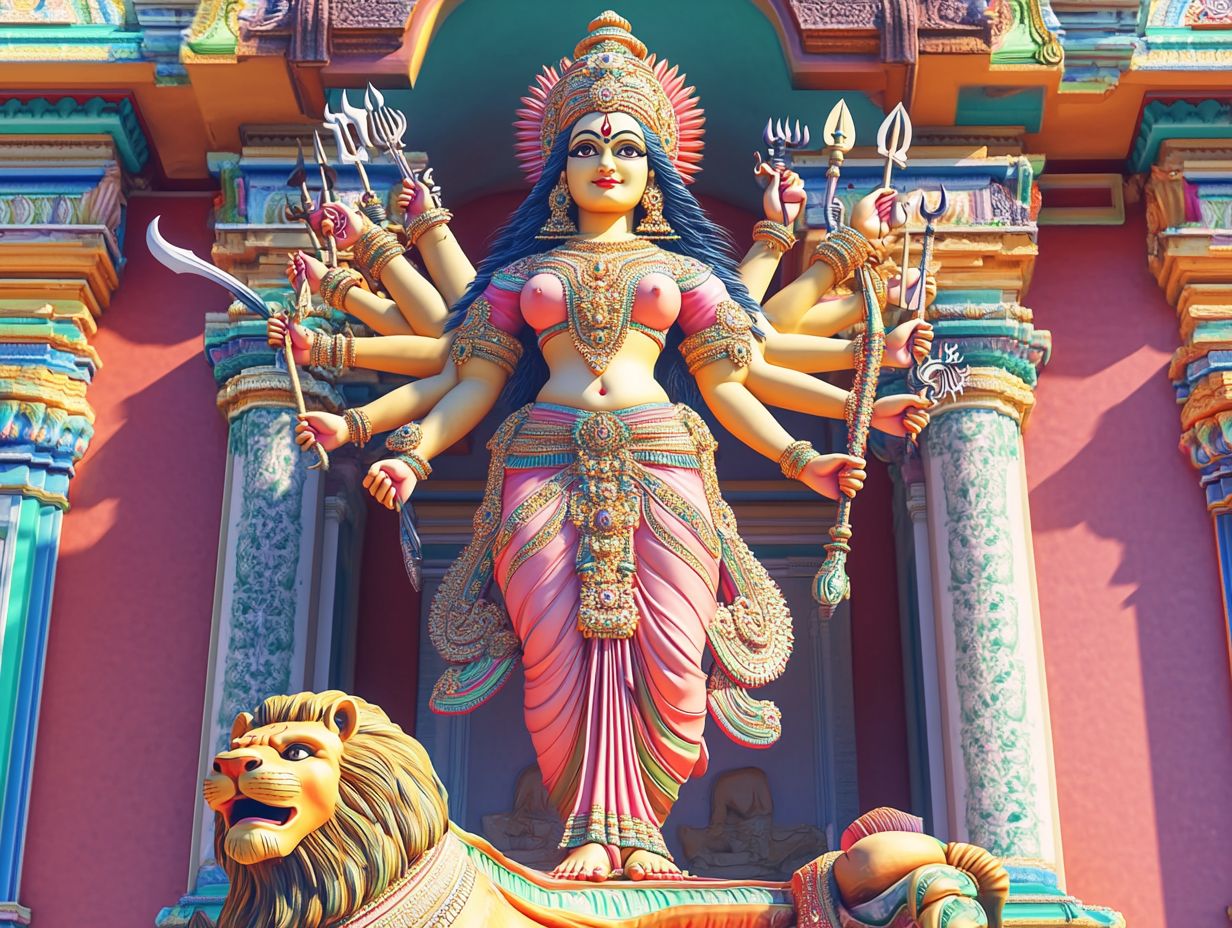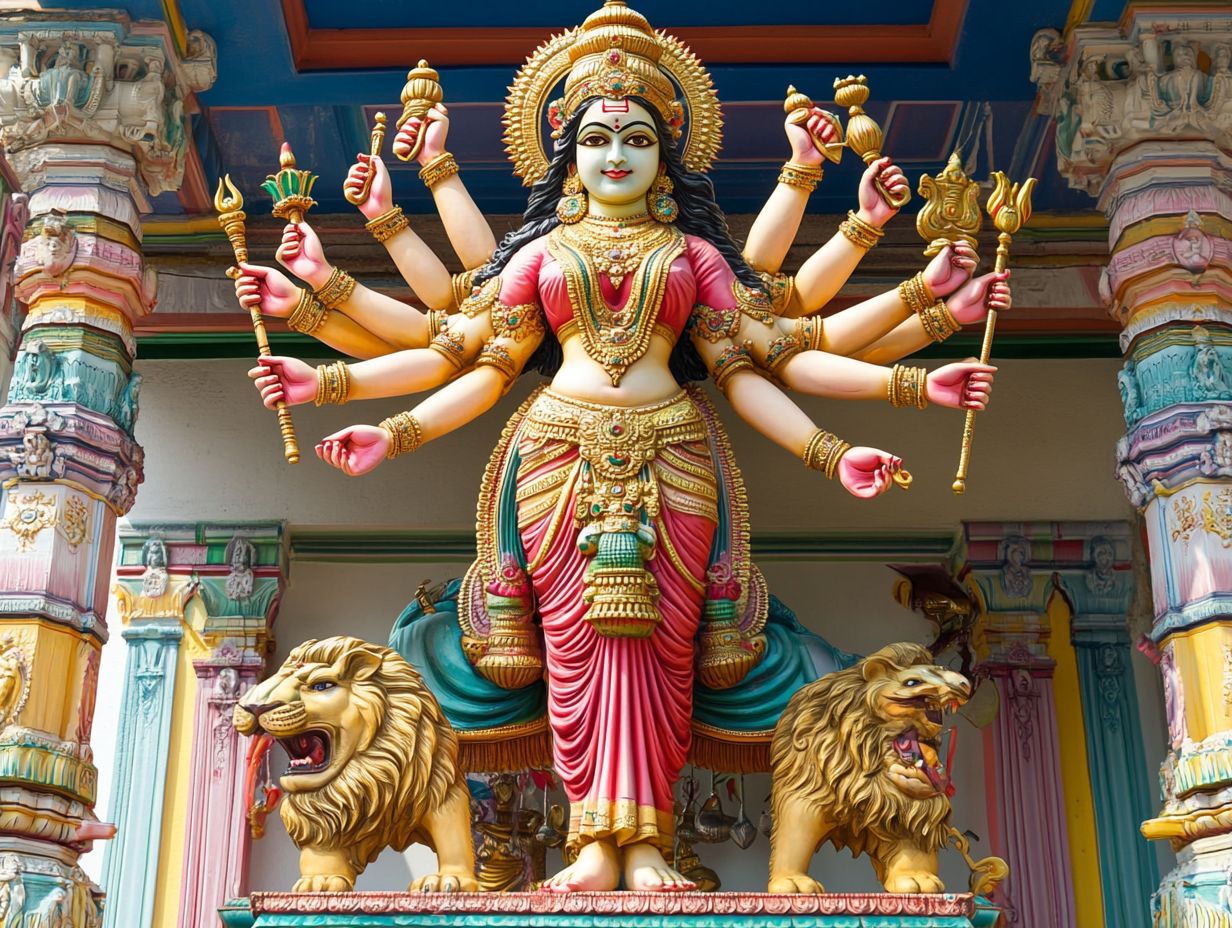Who is the God of Justice in Hinduism?
Hinduism, characterized by its rich tapestry of beliefs, offers a profound understanding of justice, morality, and truth. At the heart of these beliefs lies the concept of Dharma, which serves as the moral compass guiding individual actions and fostering societal harmony within the framework of law and order.
This exploration delves into the notion of the God of Justice, emphasizing the paramount importance of Dharma and the intricate interplay between Karma and justice. Furthermore, it examines the role of Yama, the deity associated with justice, and how these principles are illustrated in religious texts, including the Vedas, Upanishads, and Puranas.
Through this inquiry, one can uncover the foundational beliefs that steer millions in their pursuit of righteousness and cosmic balance.
What are the Basic Beliefs of Hinduism?

Hinduism, revered as one of the world’s oldest religions, presents a profound tapestry of beliefs that underscores the principles of Dharma, justice, and morality elements essential for fostering order and harmony within individual lives and the broader society.
This spiritual tradition, deeply anchored in ancient religious texts such as the Vedas, Upanishads, and Puranas, offers an intricate framework for exploring the nature of existence, the dynamic interplay between good and evil, and the quest for righteousness through ethical conduct and virtuous living. It also highlights the significance of spiritual enlightenment and devotion through worship, rituals, and ceremonies.
Who is the God of Justice in Hinduism?
In Hinduism, the God of Justice is frequently embodied by the deities Yama, Varuna, Vishnu, and Shiva, who personify the principles of ethical governance and the cosmic laws that uphold righteousness. Yama, often referred to as the Lord of Death, presides over the moral order by ensuring that individuals receive just outcomes reflective of their actions. Varuna, on the other hand, is esteemed as the guardian of cosmic order and water, enforcing divine justice through his omnipresent nature. Vishnu and Shiva further embody protection, balance, and cosmic justice within the pantheon of Hindu deities.
These deities occupy a vital position within the moral framework of Hindu belief, where the interconnectedness of actions and consequences is paramount. Yama’s role extends beyond mere retribution; he serves as a poignant reminder of the inevitable truth of karma and divine retribution, inspiring individuals to pursue a life of righteousness, fairness, and equity.
Simultaneously, Varuna’s expansive essence illustrates that justice transcends human affairs, extending to the elemental forces and the universe as a whole. Together, Yama and Varuna symbolize a harmonious approach to justice, one that weaves together moral duty with the vastness of cosmic principles, ensuring that both individuals and the universe align seamlessly with the path of dharma.
What is the Role of Justice in Hinduism?
Justice holds a central position in Hinduism, embodying the fundamental principles of righteousness and morality that guide human behavior and shape societal norms. Grounded in the concept of Dharma, justice transcends mere legal definitions; it is deeply intertwined with ethical conduct and the delicate balance of good and evil, steering individuals toward virtuous living and divine justice.
In the expansive realm of spiritual and social existence, justice emerges as a harmonious fusion of personal integrity and communal duty. Practitioners are encouraged to uphold Dharma, which serves as a guiding star for ethical decision-making and moral actions. This synergy between justice and Dharma cultivates a societal framework in which values such as compassion, truthfulness, and respect for all beings are held in high regard.
Spiritual teachings underscore that justice not only establishes equilibrium within individual lives but also enhances the broader fabric of society.
By promoting communal justice, Hindu beliefs underscore the importance of collective well-being, enableing individuals to make positive contributions to their communities and reinforcing a profound sense of unity and purpose.
The Story of Dharma in Hinduism
Dharma, a cornerstone of Hindu philosophy, embodies the moral order and duty that individuals are called to uphold. It serves as the guiding principle for righteous living, intricately woven into the fabric of cosmic law.
This multifaceted concept encompasses the ethical frameworks that inform actions across diverse situations, deftly balancing personal desires with the greater needs of society. In doing so, it fosters an environment of spiritual justice and harmony, illuminating the path toward a more enlightened existence.
Who is Dharma?
Dharma is often regarded as a divine principle within Hinduism, embodying the path of righteousness and ethical governance that individuals navigate throughout their lives. It acts as a guiding force, shaping moral choices and societal laws, while fostering a sense of responsibility and accountability in both personal and communal contexts.
Rooted in ancient texts such as the Vedas and Dharma Shastras, Dharma encompasses a broad spectrum of interpretations, including duty, virtue, law, and social order. The philosophical dimensions of this concept suggest that adhering to one’s Dharma not only fosters personal integrity but also ensures harmony and stability within society.
This intricate relationship between individual conduct and societal well-being underscores the significance of ethical governance, as leaders are called upon to uphold Dharma in order to inspire trust and fairness. Ultimately, a deeper understanding of the nuances of Dharma promotes a holistic approach to living, where personal choices resonate meaningfully within the broader community, fostering a sense of personal responsibility and accountability.
What is the Importance of Dharma in Hinduism?

The significance of Dharma in Hinduism is profound, serving as the cornerstone of justice and righteousness that shapes moral values and ethical conduct within society. By adhering to Dharma, individuals actively contribute to the preservation of order and equilibrium, ensuring their actions resonate with the broader cosmic principles and dharmic principles that govern existence.
This foundational concept provides a guiding framework for ethical governance, compelling leaders to prioritize the welfare of the community while steadfastly upholding fairness and truth. Dharma instills a sense of responsibility and duty among individuals, inspiring them to act with compassion, integrity, and devotion in their daily lives.
In a world increasingly marked by moral ambiguity, understanding and embracing Dharma becomes vital, not only for personal spiritual growth but also for nurturing a harmonious society. As individuals align their choices with these timeless principles, they embark on a transformative journey that deepens their connection to the universe and fosters collective well-being and social justice.
The Concept of Karma in Hinduism
The concept of Karma in Hinduism emerges as a fundamental principle that emphasizes the law of cause and effect, positing that every action carries consequences that influence an individual’s life and the cycle of reincarnation and fate.
This intricate interplay between actions and their repercussions lays the groundwork for comprehending justice within the spiritual framework of Hinduism. Here, the moral order is maintained through a delicate balance of good and evil, reflecting the profound understanding of life s interconnections, moral consequences, and cosmic balance.
What is Karma?
Karma, a fundamental concept in Hinduism, embodies the law of cause and effect, where every action undertaken by an individual yields corresponding consequences that may unfold in this life or the next. This principle underscores the moral fabric of the universe, functioning as a mechanism for spiritual justice and guiding individuals on their path toward enlightenment and ethical living.
Rooted in ancient scriptures, the notion of karma finds extensive elaboration in texts such as the Bhagavad Gita, where it is intricately linked to dharma, or duty. This connection highlights the profound interrelatedness of actions and their moral ramifications. Various interpretations of karma emerge from the Upanishads, which explore its subtle nuances, including the concepts of individual and collective responsibility. Rather than being merely punitive, karma fosters self-reflection, moral development, and spiritual wisdom, establishing itself as a cornerstone of Hindu ethics.
Consequently, the comprehension of karma profoundly influences how adherents navigate their lives, accentuating the significance of mindful actions and the inherent values woven into the spiritual journey and spiritual law.
How Does Karma Relate to Justice in Hinduism?
The relationship between Karma and justice in Hinduism is profoundly intricate, with Karma acting as the fundamental mechanism that governs the repercussions of one’s actions. This dynamic reinforces the principles of good and evil within the vast expanse of cosmic law. It is this interconnectedness that underscores how individuals are held accountable for their moral choices, ensuring that justice ultimately prevails over the course of time.
By perceiving Karma as a system of moral accountability, adherents of Hinduism come to understand that each decision contributes to a larger cosmic balance and integrated justice. This belief instills a sense of responsibility, encouraging individuals to act ethically, fully aware that their deeds will inevitably shape their future circumstances.
As a result, the implications of karma extend well beyond the realm of personal retribution; they also emphasize the importance of societal harmony by promoting behaviors that align with the welfare of the community. The nuanced interplay of cause and effect thus serves not only as a guiding principle for the individual but also as a collective moral compass, steering society toward justice and cohesion amid the complexities of life. This interconnectedness highlights the importance of moral duty and personal responsibility in achieving spiritual enlightenment.
The Role of Yama in Hinduism
Yama, esteemed as the God of Justice within Hinduism, occupies a pivotal position in the maintenance of moral order and the determination of souls’ destinies in the afterlife. His role underscores the importance of divine retribution and cosmic balance within the framework of spiritual law.
As the guardian of Dharma, he meticulously ensures that individuals confront the consequences of their actions, navigating them through the intricate realms of justice, punishment, and reward. This emphasizes the importance of ethical conduct and moral values in the context of cosmic order and divine justice.
In this capacity, Yama upholds the fundamental principles of ethical conduct and righteousness, embodying the unwavering commitment to moral integrity in the cosmic order. His judgments reflect the principles of equitable treatment and fairness, ensuring that justice is served in accordance with universal law.
Who is Yama?

Yama, often portrayed as a formidable yet just figure, holds the esteemed position of the God of Justice within Hinduism, tasked with guiding souls to their designated afterlife destinations. As the Guardian of the Dead, he embodies divine qualities that urge individuals to adhere to Dharma, thereby reinforcing the tenets of justice and moral order. His role is central to the integrated justice system within Hindu beliefs, balancing punishment and reward to maintain cosmic justice.
This ancient deity is frequently illustrated riding a black buffalo and wielding a noose, symbols that encapsulate his dual role as both guardian and enforcer. In various mythological narratives, his interactions with mortals reveal the delicate balance of reward and punishment, underscoring his steadfast commitment to upholding cosmic law. Through these mythological narratives, Yama’s actions highlight the themes of truthfulness and moral consequences.
Yama’s influence extends far beyond the realm of mortuary practices; he serves as a poignant reminder that moral integrity and righteous actions shape one’s destiny. Festivals dedicated to him, such as Naraka Chaturdashi, emphasize the importance of honoring ancestors and fostering good deeds, intricately weaving his presence into the spiritual lives of devotees. Through these observances, Yama reinforces the paramount significance of ethical conduct in every facet of existence, reminding individuals of the principles of virtue ethics and personal responsibility.
What is the Role of Yama in Hinduism?
The role of Yama in Hinduism transcends mere judgment; he emerges as a pivotal figure who sustains the delicate equilibrium between justice and morality, ensuring that ethical conduct receives its due rewards while wrongdoing faces appropriate retribution. As the sovereign of the afterlife, Yama s assessments serve as reflections of an individual’s actions aligned with Dharma. This underscores the importance of divine ideals and moral duty within the framework of Hindu philosophy.
His influence is intricately woven into the very fabric of moral principles, deftly guiding individuals along their righteous journeys while simultaneously reminding them of the repercussions that stem from their choices. In essence, Yama epitomizes the universal laws of cause and effect, directing souls to their rightful destinations based on their commitment to virtuous living. This notion aligns with the concept of reincarnation and fate, where one’s actions in this life influence their future existences.
This guardianship not only reinforces the paramount importance of ethical existence but also fosters the spiritual evolution of souls, encouraging them to contemplate their actions and pursue self-improvement. It highlights the journey toward spiritual progress and enlightenment through adherence to dharmic principles.
Through his impartial oversight, Yama personifies the complex interplay between justice and morality within the spiritual realm, illuminating the path toward ethical living and deeper understanding.
How is Justice Served in Hinduism?
In Hinduism, justice unfolds through a sophisticated interplay of divine ideals and human actions, where the notions of punishment and reward are intricately interwoven into the very fabric of the justice system. This reflects the underlying cosmic principles that govern the universe, emphasizing the importance of divine authority and the principles of cosmic justice.
This spiritual framework underscores the significance of moral choices, illuminating the mechanisms by which divine justice operates within the spheres of ethical conduct and personal accountability. It demonstrates the balance between Hindu deities and their roles in maintaining order and protection within the cosmos.
What are the Laws and Principles of Justice in Hinduism?
The laws and principles of justice within Hinduism are chiefly articulated in sacred texts such as the Dharma Shastras and the Manusmriti. These sacred scriptures offer a comprehensive framework for ethical behavior and societal norms, delineating the moral principles that underpin justice and underscoring the significance of Dharma in guiding both individual actions and collective conduct.
The concept of Dharma is pivotal in interpreting justice, illuminating not only the moral obligations of individuals but also their responsibilities toward the broader community. Discussions surrounding these texts often emphasize that justice is not a uniform doctrine; rather, it necessitates a thoughtful consideration of context, time, and circumstances. This perspective aligns with Hindu philosophy and the intricate nature of transcendental justice.
For example, while ancient interpretations may advocate for rigid adherence to caste duties, contemporary perspectives strive to reinterpret these principles through a more inclusive lens, aligning them with modern notions of ethical governance. Engaging with these texts in the present day requires a sophisticated understanding of their implications for social justice, human rights, and equality, fostering a dialogue that effectively bridges ancient wisdom with contemporary societal values. This dialogue reflects the evolving nature of moral duty and cultural beliefs within the context of social justice.
How is Justice Reflected in Hindu Scriptures?
Justice emerges as a recurring theme within Hindu scriptures, particularly evident in the Vedas, Upanishads, and Puranas, which collectively articulate the ethical conduct expected of individuals. These texts illuminate the principles of justice and righteousness, offering guidance to adherents in their moral decisions and spiritual practices. The religious texts serve as a foundation for understanding ethical conduct and divine grace in the pursuit of justice.
The concept of dharma, or duty, is central to the understanding of justice, underscoring the significance of ethical behavior in both personal and communal life. A prime example is found in the Mahabharata, which recounts the story of Yudhishthira. His unwavering commitment to truth, even amidst overwhelming adversity, serves as a profound lesson on integrity and fairness. This narrative emphasizes the importance of virtue and ethical behavior in the context of Hindu deontology.
Furthermore, the verses of the Manusmriti provide a framework for just governance, emphasizing that rulers must uphold justice to sustain order and harmony within society. These legal principles highlight the necessity of equity and fairness in leadership. Through these narratives and teachings, the scriptures prompt contemplation of the intricate nature of justice and the moral responsibilities individuals hold within their communities.
Frequently Asked Questions

Who is the God of Justice in Hinduism?
The God of Justice in Hinduism is known as Dharma, or sometimes referred to as Yama. Dharma is the divine embodiment of truth, righteousness, and moral law. His role underscores the importance of cosmic principles and divine order in maintaining justice.
What is the significance of Dharma in Hinduism?
Dharma plays a crucial role in Hinduism, as it governs the order and balance of the universe. It is believed that following the path of Dharma leads to a fulfilling and righteous life. This path also supports the attainment of liberation (moksha) and spiritual wisdom.
Is Dharma the only God of Justice in Hinduism?
No, while Dharma is often considered the primary God of Justice in Hinduism, there are other deities associated with justice, such as Varuna, the god of water and law, and Kala Bhairava, the god of time and justice. These protective deities ensure the maintenance of divine justice within the cosmos.
How is Dharma depicted in Hinduism?
Dharma is often depicted as a male deity with four arms, carrying a conch, a discus, a sword, and a lotus. He is also sometimes shown riding a water buffalo or a bull. These symbols represent his authority over divine justice and cosmic balance.
What is the role of Dharma in Hindu mythology?
In Hindu mythology, Dharma is responsible for ensuring that the laws of the universe are upheld and that justice is served. He is also seen as the judge of a person’s actions in the afterlife, reinforcing the principles of equity and fairness through his judgments.
How can one honor Dharma in Hinduism?
In Hinduism, honoring Dharma involves following the moral and ethical codes set forth by the deity. This includes being truthful, just, and compassionate towards others, and living a righteous life. Practices such as worship, rituals, and meditative practices help in aligning one’s actions with Dharma.
